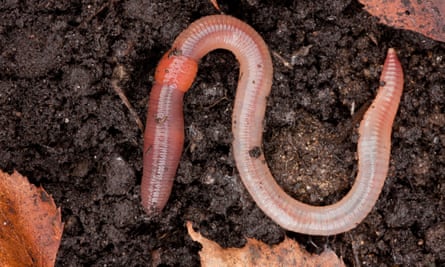The people have spoken and the choice of Guardian readers for the final nominee for UK invertebrate of the year is resounding: all hail Lumbricus terrestris, the common earthworm.
The common earthworm – also known as the lob worm, dew worm, nightcrawler and, in Germany, the rain worm – is the soil-maker. Without its labours, we would struggle to feed ourselves.
Worms can bring 40 tonnes of soil to the surface per hectare a year in Britain. They are the engineers of an ecosystem that may be as diverse as the Amazon rainforest. Their diggings aerate soil and they pull fallen leaves and other organic matter into the earth and recycle them. Worms make soils less prone to flooding in winter and less baking hard in summer, they boost microbial activity and, of course, support plant growth.

But #VoteWorm is to celebrate majesty and dignity too. These are gorgeous creatures, many shades of pink, stretching out to 35cm long, and coiling and gliding – never “slithering”, as the pestilent centipede put it in James and the Giant Peach – through the earth.
The worm’s backers know this well. Lily, aged four, nominates the earthworm “because they help make compost to help our garden grow, they feel very soft and when they have got mud on them they are like a wiggly piece of string”.
We think the myopic adult world is blind to the brilliance of worms but they have long had influential advocates from Cleopatra and Charles Darwin to George Monbiot.
Today, Guardian-reading soil scientists and horticulturalists make a powerful case to Vote Worm but so, too, does Gill from North Wales, who has been earthworm-phobic since she was Lily’s age. “Much gratitude for all the thrashing ones, the little thready ones, the slimy ones, the knotted ones, the ones with ‘saddles’, the blue-tinged ones, even the enormous ones stretching terrifyingly across my drive when the ground is sodden,” she writes. “Thank you all, for what you do.”
Take heed of Trevor Lawson from Amersham. Not only are earthworms critically important, he argues, they are “the best symbol of everything that matters about being an invertebrate in our anthropocentric worldview – vulnerable, crushable, rarely considered, even despised for their apparent blind ignorance, and yet through sheer force of numbers and extraordinary evolutionary adaptation, they are capable of shaping the entire world around us as we, in our own wilful ignorance, stumble blindly on.”
#VoteWorm’s last word goes to reader Jacqui from Wiltshire who says: “200 words for this hero?! Really! Give the worm a gong!”
At midnight on Friday 12 April, voting will open to decide the Guardian’s UK invertebrate of the year with the winner to be announced on Monday 15 April.
